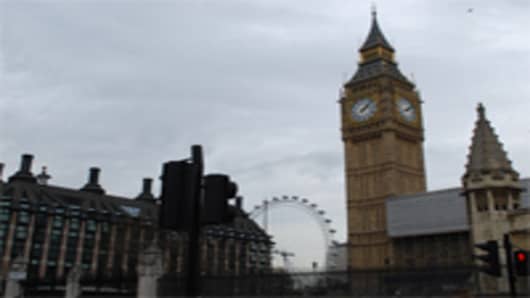George Osborne has urged euro zone leaders to “get a grip” on the sovereign debt crisis at their summit today, warning that failure to do so could unleash an economic crisis as serious as the recession that followed the banking crash of 2008.
The chancellor told the Financial Times he was “very worried” about the possibility of the euro zone crisis spiralling out of control, warning that it posed an additional threat to Britain’s already “tough” economic situation.
“We see the potential for a set of economic events that could be as damaging as 2008,” he said, as he made his most direct intervention yet in the euro zone crisis.
The chancellor was optimistic that the eurogroup of finance ministers would make progress with involving the private sector in reducing Greece’s debts but said this was only the first step towards a necessary fiscal union in the single currency area.
He recognised that his enthusiasm for greater eurozone integration turned British policy on its head, since it ends the government’s long-standing desire to frustrate the creation of a two-speed Europe. He said “the remorseless logic” of monetary union was greater fiscal union.
Mr Osborne has been accused of standing on the sidelines while the euro zone crisis escalated. But frustration in British government circles about the failure of Germany, in particular, as well as other euro zone countries to resolve the problem is reaching boiling point.
Mr Osborne did not criticise Germany directly but he called for greater economic integration of the single currency area, adding that the idea of euro zone bonds was “worthy of serious consideration”.
However, Mr Osborne argues that the loss of sovereignty implied by solutions such as eurobonds justifies Britain’s refusal to join the euro.
Core euro zone countries, such as Germany, would have to stand behind southern European sovereign debt as guarantors, while the periphery would have to accept German-designed economic policy in return.
He also called for private sector bond holders to share the pain and for the euro zone’s bail-out facility to be expanded to include the purchase of Greek bonds. But he said Britain would not take part in any euro zone solution.
“Britain’s taxpayers stand behind the pound, Europe’s taxpayers are going to have to stand behind the euro,” he said. He also dismissed the idea of a European bank tax to pay for some of Greece’s new bail-out as a “red herring”.
The chancellor insisted there would be no retreat on his tight fiscal consolidation, but admitted that Britain was carrying some “heavy weights” as it struggled to recover from the last recession.
The chancellor’s cautious tone on the economy came as the Treasury published its latest round-up of independent forecasts showing the average of new external estimates for growth have slipped every month from 1.7 percent in March – in line with the Office for Budget Responsibility’s prediction – to 1.3 percent in July.


